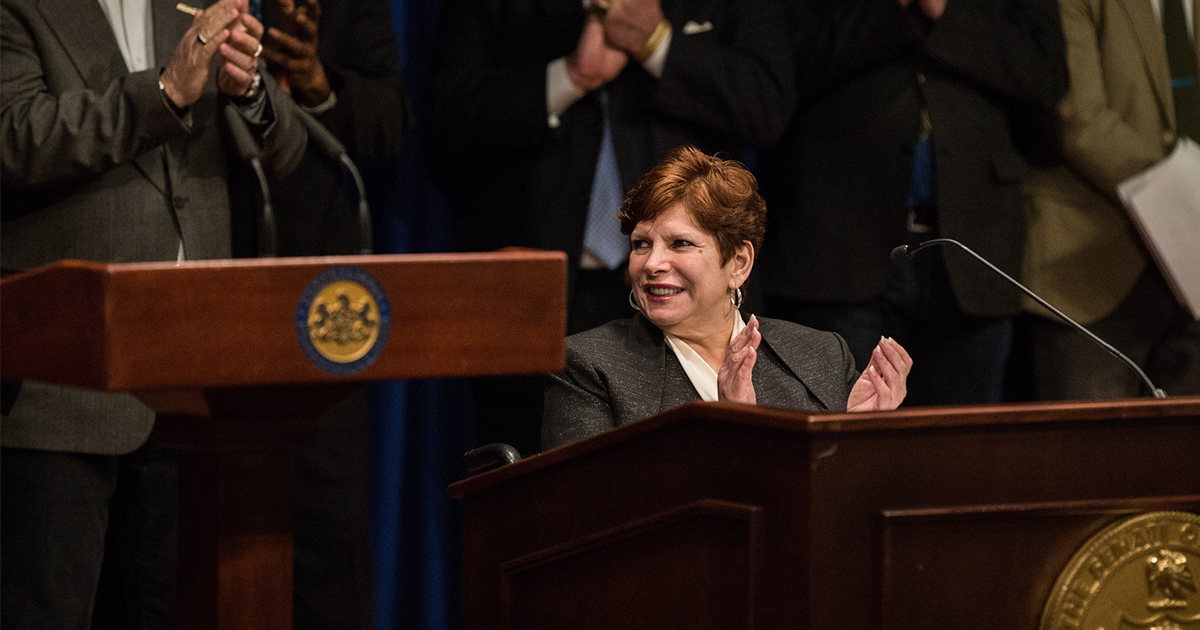
by Christin Brown | January 8, 2019 | News Releases
HARRISBURG, PA, January 8, 2019 – State Sen. Christine M. Tartaglione (D-Philadelphia) has been reappointed as minority chairwoman of the Senate Labor & Industry Committee, where she will continue her work to protect the rights and promote the interests of Pennsylvania’s workforce.
Senate Democratic Leader Jay Costa Jr. announced the appointments of minority chairs for all 22 of the chamber’s standing committees yesterday for the 2019-20 legislative session, which began on January 1.
“As a former union organizer and business representative, I am keenly aware of and focused on the issues affecting all Pennsylvania workers,” Sen. Tartaglione said. “During my 24 years in the Senate, I have taken a leadership role in Harrisburg and in my home district on priorities including raising the minimum wage, workplace safety, wage equality, overtime pay protection, protection from discrimination and harassment, and workforce development. I look forward to continuing my collaboration with the Labor Committee, labor organizations, independent workers, and employers to further these paramount objectives and to grow family-sustaining jobs.”
Prior to being elected to the Senate in 1994, Tartaglione served as an organizer and business representative for the United Food and Commercial Workers Local 1776. During the 2005-06 legislative session, her bill to raise Pennsylvania’s minimum wage was enacted. The legislature hasn’t raised the minimum wage again since then.
In the 2009-10 session, Tartaglione’s bill to address the Commonwealth’s short-term and long-term healthcare workforce challenges and to ensure an adequate supply of quality workers in the industry was enacted. During the 2011-12 session, her bill to fund the hiring of additional Pennsylvania State Police troopers was enacted.
Additionally, Tartaglione has taken a leading role in extending unemployment compensation benefits for jobless workers, and in providing for a shared work alternative to the termination of job positions by employers.
The 2019-20 Pennsylvania Senate session is scheduled to resume on January 15, when Gov. Tom Wolf and Lt. Gov. John Fetterman will be sworn into office.
# # #
If you would like more information about this topic, please contact William Kenny at 215-533-0440 or email at [email protected].
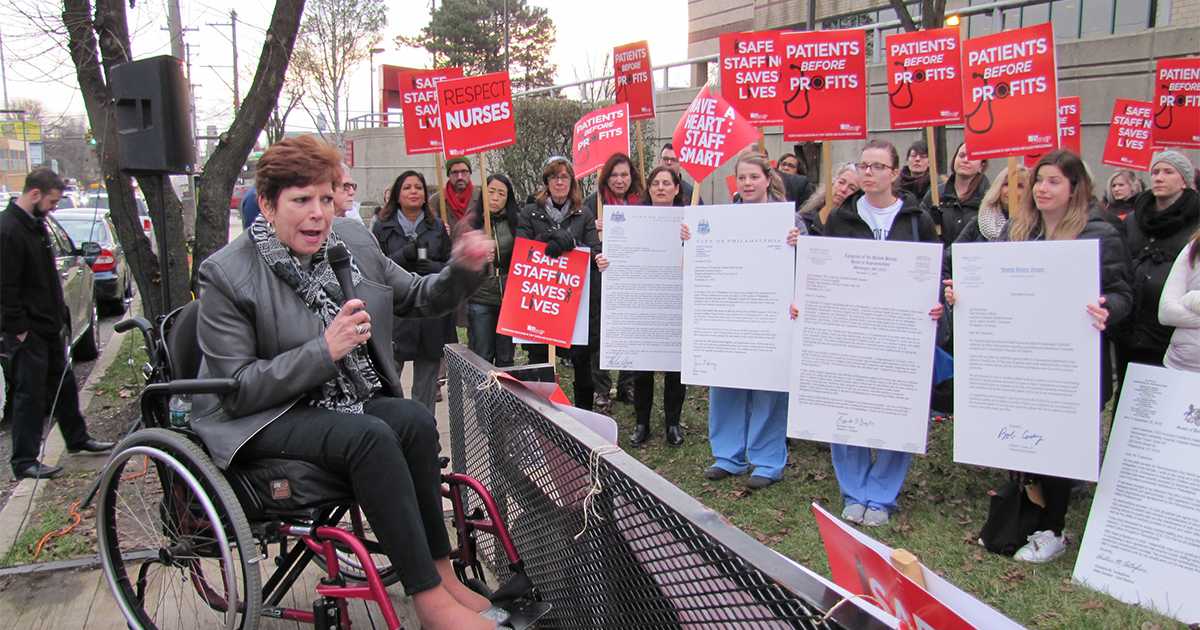
by Christin Brown | January 3, 2019 | News Releases
Unionized nurses from St. Christopher’s Hospital for Children and Hahnemann University Hospital have been working without a contract since November.
PHILADELPHIA, PA, January 3, 2019 – State Sen. Christine M. Tartaglione (D-Philadelphia) joined picket lines today at two Philadelphia hospitals where registered nurses are fighting for a safe staffing commitment and fair compensation from their common employer.
Nurses from St. Christopher’s Hospital for Children in Juniata Park and Hahnemann University Hospital in Center City have been negotiating since August with American Academic Health System, the private, for-profit company that bought both medical facilities last January. The nurses are members of the Pennsylvania Association of Staff Nurses and Allied Professionals (PASNAP) and have been working without a contract since their last collective bargaining agreement expired in November.
Union leaders say that management has been unwilling to include minimum nurse-to-patient ratios in a new contract while offering fair compensation that will enable the hospitals to retain and recruit talented nurses.
“I know that on the table were safe staffing levels that you had agreed to, and at the last minute, they were pulled and they said you had to choose between a raise and safe staffing levels,” Sen. Tartaglione told dozens of picketing nurses outside St. Christopher’s. “That is unacceptable. I want to know, would anybody on the other side of the table, would they bring their kids to St. Chris with the staffing levels they want to implement? I doubt it.”
PASNAP leaders cite research documenting that increased nurse staffing levels correlate directly to fewer patient fatalities, fewer medical complications, earlier patient discharge dates, and improved satisfaction for patients and their families. Meanwhile, wage improvements correlate to higher nurse retention and job satisfaction.
“You’re a mother, you’re a father, you’re a social worker for those children when their parents aren’t there,” Sen. Tartaglione said. “You’re the ones holding their hands and saying, ‘Baby, it’s gonna be OK.’ I know what you do every day. You deserve to be paid for it and you deserve to give the children the services they need.”
Tartaglione has been a leading advocate in the Pennsylvania Senate for safe nurse staffing levels. During the 2017-18 legislative session, she co-sponsored S.B. 214 to establish minimum nurse-to-patient ratios under state law. The state already has minimum staffing ratios for child daycare facilities. But there are no such requirements for hospitals.
Today’s picketing did not coincide with work stoppages at St. Christopher’s or Hahnemann. Organizers described the events as informational in nature. PASNAP represents about 1,400 nurses at the two medical facilities and more than 8,000 members statewide.
For video coverage of today’s demonstrations, visit the Facebook page @SenatorTinaTartaglione.
# # #
If you would like more information about this topic, please contact William Kenny at 215-533-0440 or email at [email protected].
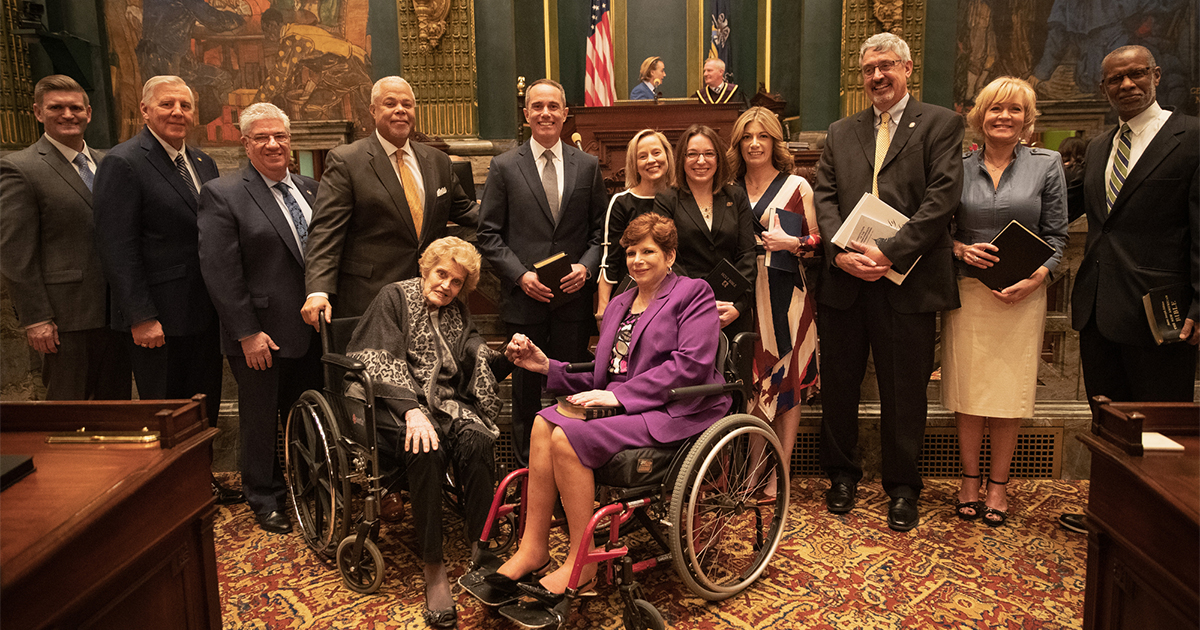
by Christin Brown | January 1, 2019 | News Releases
During a ceremony in the Pennsylvania Capitol, State Sen. Christine M. Tartaglione and her new and returning Senate colleagues were sworn into office.
HARRISBURG, PA, January 1, 2019 – State Sen. Christine M. Tartaglione (D-Philadelphia) today commenced her seventh consecutive four-year term as she was sworn into office at the Pennsylvania Capitol alongside 24 colleagues who were reelected or newly elected to the Senate in November.
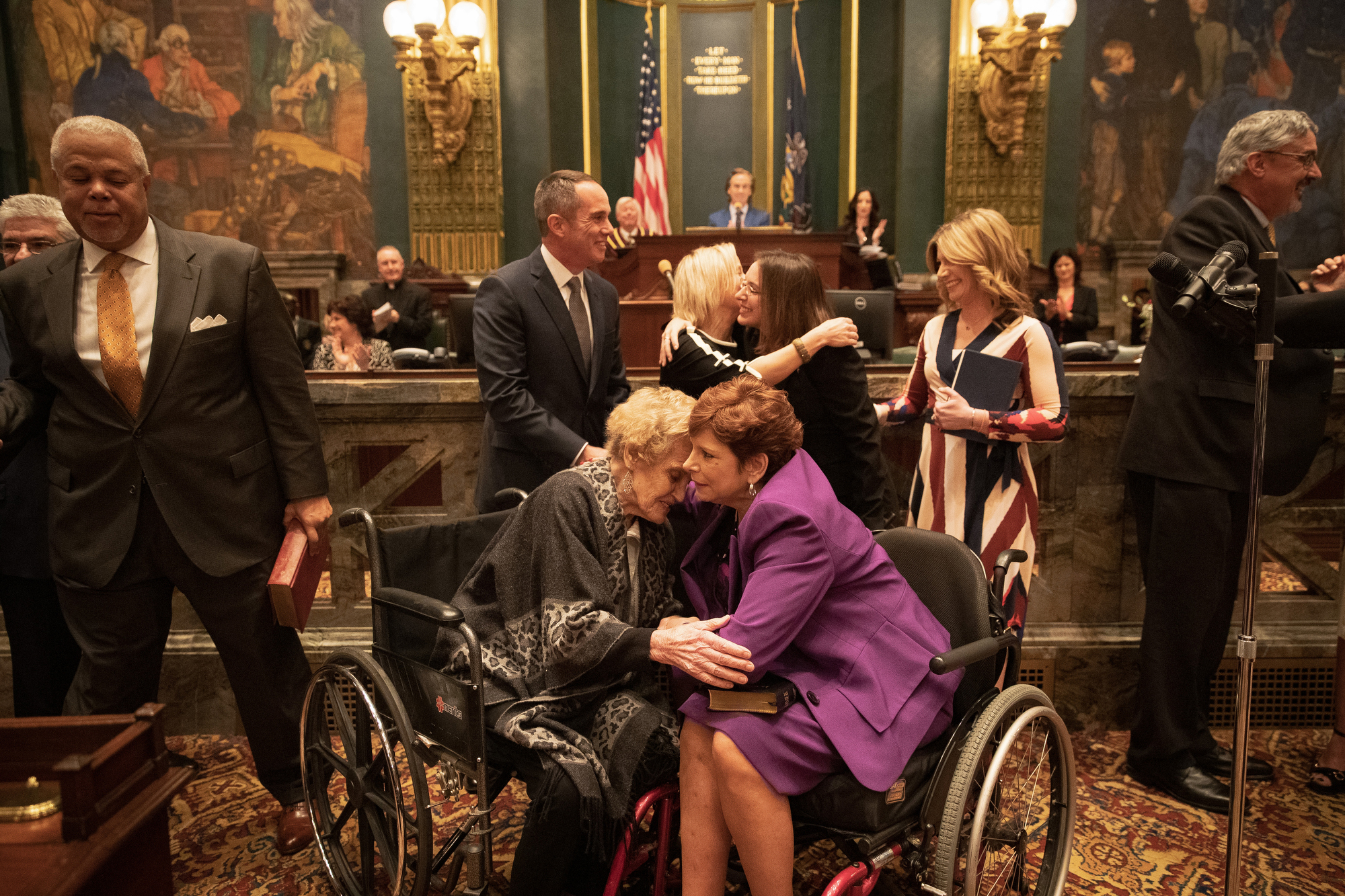 Pennsylvania Supreme Court Associate Justice Kevin M. Dougherty led Democratic senators in reciting the oath of office. Tartaglione’s mother, longtime Philadelphia City Commissioner Marge Tartaglione, took part in the ceremony by holding the Holy Bible used by her daughter to take the oath.
Pennsylvania Supreme Court Associate Justice Kevin M. Dougherty led Democratic senators in reciting the oath of office. Tartaglione’s mother, longtime Philadelphia City Commissioner Marge Tartaglione, took part in the ceremony by holding the Holy Bible used by her daughter to take the oath.
Chief Justice Thomas G. Saylor administered the oath to Republicans. The 25 newly sworn senators will comprise half of the 50-member legislative body during the 2019-20 session. Twenty-five other senators are now midway through their current four-year terms.
“I am honored and proud that the voters of the 2nd Senatorial district chose me once again to serve them as their advocate and voice in Harrisburg,” Sen. Tartaglione said. “I enthusiastically accept this responsibility with the intention of continuing to fight for the best interests of the working people, retirees, school children, and community-based organizations of the district and throughout the entire state.”
In the 2018 election, Democrats gained five seats in the Senate and reduced the Republican majority to 29-21. Tartaglione noted that the Senate welcomed five new women senators today. Women now hold 11 seats, a net gain of four over the 2017-18 session. When Tartaglione was first elected in 1994, she became only the fifth woman ever elected to the PA Senate.
“I am thrilled to see that Democrats and women are finally gaining significant ground in their struggles for equitable representation in the Senate,” Tartaglione said. “More than 51 percent of the Pennsylvania population is female, while Democrats comprise the largest political party in the state by more than 815,000 registered voters. It’s only fair that those statistical facts are reflected in the composition of the Senate.”
With the 2019-20 legislative session at hand, Tartaglione said she will continue to push for workplace rights, educational opportunities, and healthcare protections for the people of the 2nd Senatorial District and all of Pennsylvania.
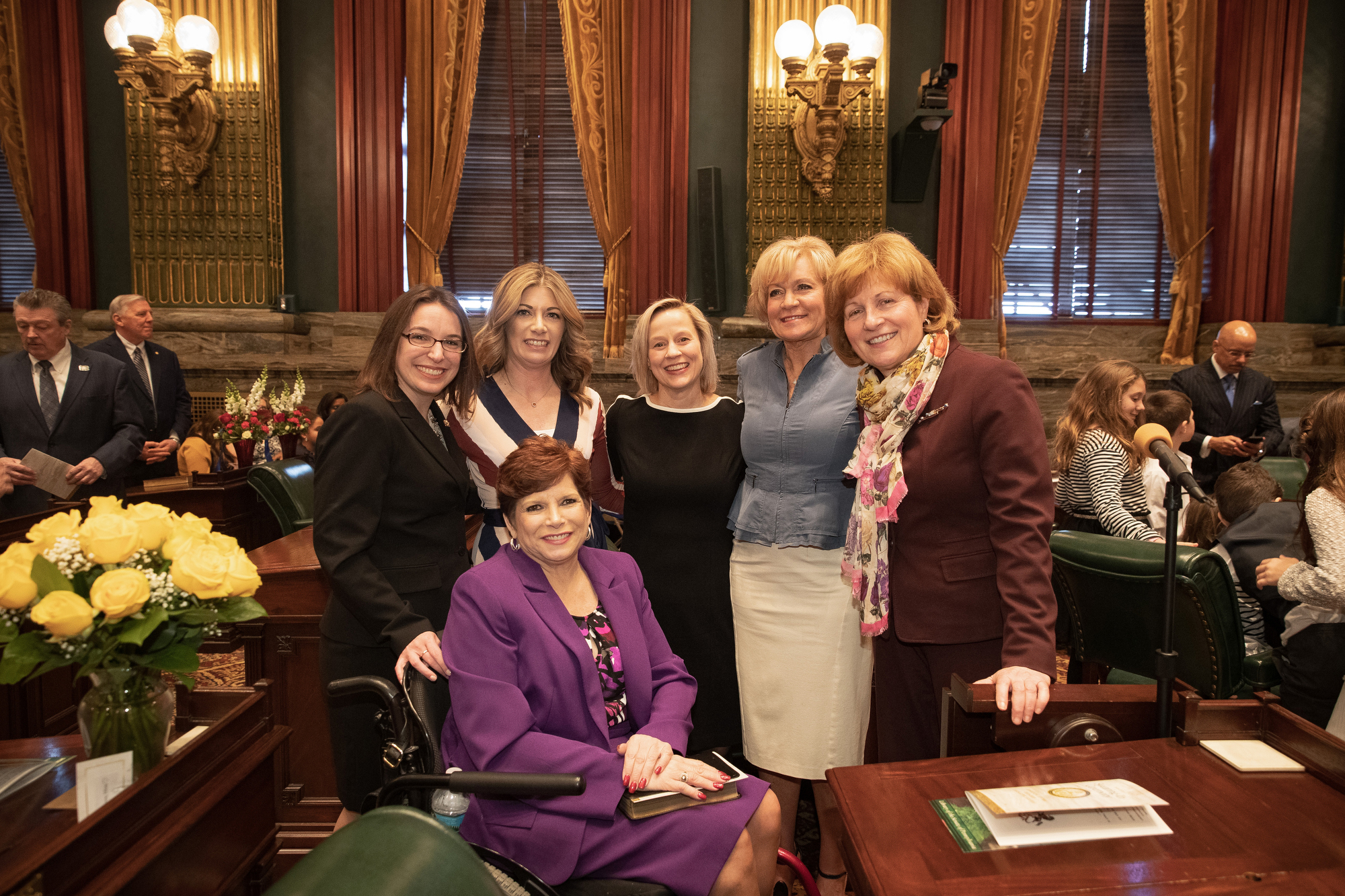 “We are at a critical juncture for our state and for the nation, a time when the economic gap between the very rich and the rest of us continues to widen, and when many corporations, large and small, along with their political allies are driving a coordinated campaign to repeal long-established labor protections, keep wages low, undermine affordable healthcare, and jeopardize retirement security,” Tartaglione said.
“We are at a critical juncture for our state and for the nation, a time when the economic gap between the very rich and the rest of us continues to widen, and when many corporations, large and small, along with their political allies are driving a coordinated campaign to repeal long-established labor protections, keep wages low, undermine affordable healthcare, and jeopardize retirement security,” Tartaglione said.
“History tells us that a thriving middle class is the foundation of a prosperous society, and that strong labor unions support a vibrant middle class. That’s why I will continue to lead the fight in Harrisburg for a family-sustaining minimum wage and for fair labor laws that allow unions to balance the playing field between workers and management.”
“Education is another pillar of a strong middle class and prosperous economy, so I will continue to advocate in the Capitol for equitable public-school funding, along with apprenticeship and vocational programs that will prepare future generations of workers for success.”
Along with these vital initiatives, Tartaglione also maintains a keen focus on the state’s opioid epidemic, which has negatively impacted the 2nd district as much as any area of Pennsylvania.
“Working together with state and local officials, healthcare providers, community organizations, the recovery community, and those afflicted by opioid use disorder, I am determined to develop solutions to a problem that is killing Pennsylvanians by the thousands, solutions that will deliver help directly where it’s needed and will enhance the quality of life in affected communities.”
# # #
If you would like more information about this topic, please contact William Kenny at 215-533-0440 or email at [email protected].

by Christin Brown | November 30, 2018 | News Releases
HARRISBURG, PA, November 30, 2018 – State Sen. Christine M. Tartaglione today encouraged prospective college students who may be applying for financial aid in 2019 to consider the new PA Forward Student Loan Program as part of their financial planning.
The Pennsylvania Higher Education Assistance Agency (PHEAA) recently announced the creation of the loan program, which is designed to complement other forms of student aid, such as the PA State Grant Program and low-cost federal loans. PHAA described the new program as a borrower-friendly suite of low-cost alternative loans that will be available to Pennsylvania students starting with the 2019-20 academic year. Application deadlines have not been announced.
“As higher education costs continue to rise in Pennsylvania and around the nation, many students face a seemingly insurmountable financial burden that scholarships, grants, and other loan programs fail to meet,” Senator Tartaglione said. “This new program will help bridge the funding gap for students with high aspirations, but limited resources.”
PHEAA is the lender and servicer of the loans, with tax-exempt financing provided by the Pennsylvania Department of Community and Economic Development. The program offers affordable loans for undergraduate and graduate students, as well as parent borrowers. Also, borrowers who are in repayment may apply for a PA Forward Refinance Loan to consolidate outstanding student debts and achieve lower monthly payments.
PA Forward participants can borrow up to the total cost of attendance with competitively low interest rates. There are immediate credit approvals and flexible repayment options, with no application or origination fees. Borrowers can get discounted interest rates by enrolling in an automatic direct debit repayment program and simply by graduating.
“I am a firm believer that a strong education starts young people on the road to success. And for many of them, college is the best avenue,” Senator Tartaglione said. “When we give them greater access to higher education, we position them to support their future families and to bolster a healthy Pennsylvania economy.”
PHEAA encourages students and their families to exhaust all eligibility for grants and scholarships before considering a student loan. When borrowing, students should first apply for low-cost federal student loans before turning to alternative student loans, which often have higher interest rates.
Visit PHEAA’s MySmartBorrowing.org website for information about how different career, school, and financial decisions during the college planning process can influence the total cost of education and a student’s ability to repay student loans. Visit PHEAA.org/PA-Forward for information about the PA Forward program and to access the application when it becomes available in 2019.
# # #
If you would like more information about this topic, please contact William Kenny at 215-533-0440 or email at [email protected].
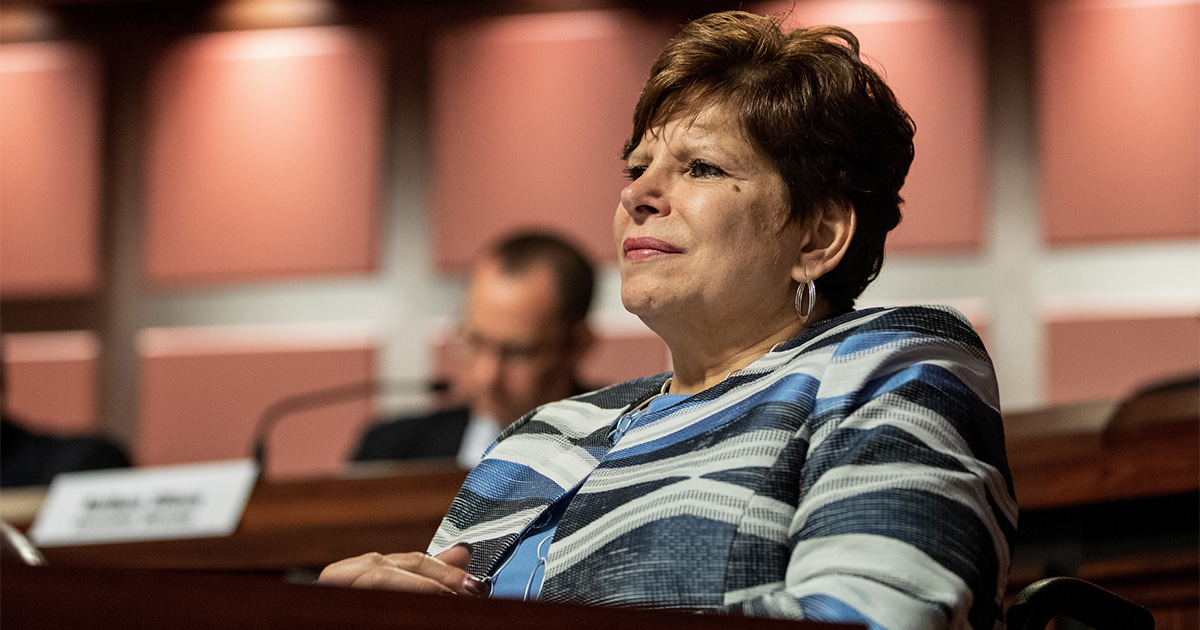
by Christin Brown | November 14, 2018 | News Releases
HARRISBURG, PA, November 14, 2018 – State Sen. Christine M. Tartaglione was selected today by her peers to serve her second consecutive term as chairwoman of the Senate’s Philadelphia delegation for the 2019-20 legislative session.
As chairwoman, Senator Tartaglione will lead the delegation of seven Democrats who represent portions of Philadelphia in the 50-member Senate. Philadelphia is Pennsylvania’s most populous county with more than 1.5 million residents.
“I am very honored that my fellow Philadelphia Democrats chose me to continue as the leader of our delegation,” Tartaglione said. “Serving in this role is a tremendous privilege and a major responsibility. Philadelphia is a great city, but it also faces many significant challenges. As chairwoman, I will have a strong opportunity to influence statewide policy while ensuring that the city’s needs are addressed.”
Senator Tartaglione was first elected to the Senate in 1994 representing the 2nd District and will be one of the three longest-serving senators during the 2019-20 session. She is the longtime minority chair of the Senate Labor and Industry Committee and was first selected as Philadelphia delegation chair for the 2017-18 legislative session, which is scheduled to adjourn Nov. 30.
“As a delegation, we have many important causes to advocate such as educating our children, growing the middle class through family-sustaining employment, eradicating the opioid epidemic, ensuring full access to healthcare, helping the needy and promoting social justice,” Tartaglione said. “I will continue to work hard to ensure that our delegation remains united in our mission to solve our problems and improve the lives of all Philadelphians.”
# # #
If you would like more information about this topic, please contact William Kenny at 215-533-0440 or email at [email protected].
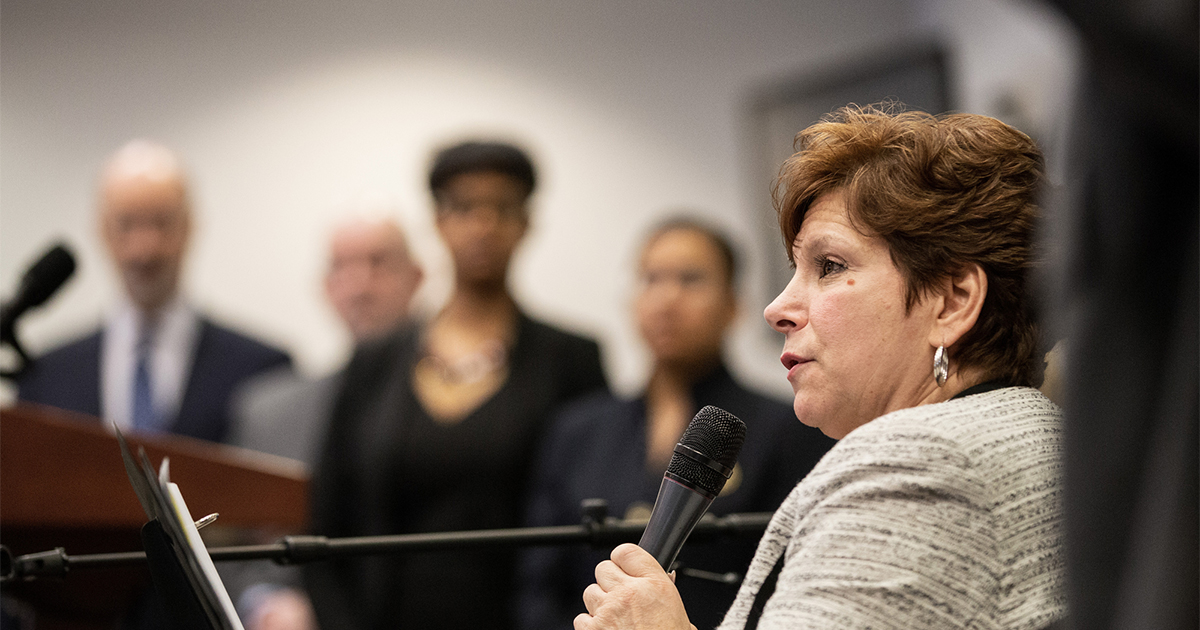
by Christin Brown | November 8, 2018 | News Releases
PHILADELPHIA, PA, November 8, 2018 – State Sen. Christine Tartaglione today issued the following statement regarding the mass shooting of at least 12 people in a Thousand Oaks, California, night club last night:
“Today, we are witnessing another heartbreaking, senseless American tragedy. Just 11 days after a person with guns murdered 11 worshipers in a Pittsburgh synagogue, another person with a gun murdered at least 12 innocent victims in a California nightclub. Words cannot express the grief I feel for these victims and their loved ones. As a nation, it’s our obligation to do everything in our power to stop these catastrophes from happening. We cannot wait any longer.”
# # #
If you would like more information about this topic, please contact William Kenny at 215-533-0440 or email at [email protected].

by Christin Brown | October 30, 2018 | News Releases
The Frankford CDC is partnering with the Water Department, the PA Horticultural Society and the Sustainable Business Network to offer eco-friendly events.
HARRISBURG, PA − October 30, 2018 – State Sen. Christine Tartaglione today announced that the Frankford Community Development Corporation will host a Rain Check Workshop at the Frankford Branch Library, 4634 Frankford Ave., on Wednesday, Nov. 14, at 5:30 p.m.
The Philadelphia Water Department is partnering with the Pennsylvania Horticultural Society and the Sustainable Business Network on the Rain Check program, which enables volunteer participants to obtain a free rain barrel for storm water collection, as well as reduced pricing for downspout planters, rain gardens, depaving, and permeable pavers.
“Storm-water management is a pressing environmental concern in the 2nd Senate District and throughout Philadelphia,” Sen. Tartaglione said. “The Rain Check program gives participating residents the knowledge and tools to relieve the burden on the city’s storm sewers during major rain events. The program helps to ease flooding and prevent pollution from spilling into our streams.”
The Nov. 14 workshop will last one hour and will be followed by a question and answer session. It will be held in the library’s downstairs meeting room. Visit www.pwdraincheck.org or call 215-988-1698 for information.
Also, The Frankford CDC is still accepting registrations for its Yard Tree Giveaway on Nov. 4, from 1 to 3 p.m., at Frankford Pause Park, 4673 Paul St. (In case of rain, the event will be inside the Daral Building at 4667 Paul St.)
Registrants are eligible to receive a free tree suitable for planting in their yard. Trees must be planted in the ground, not in containers. They must planted on private property and not along the public sidewalk. Participants will also have access to free recycling bins and other sustainability resources. Contact Ellie Vamos at [email protected] or 215-743-6580 ext. 105 to register.
# # #
If you would like more information about this topic, please contact William Kenny at 215-533-0440 or email at [email protected].

by Christin Brown | October 24, 2018 | News Releases
KYW Newsradio will host Flashpoint LIVE: Women Who Work! in Philadelphia this Thursday, Oct. 25. The public is invited to register.
PHILADELPHIA, PA, October 24, 2018 – State Sen. Christine Tartaglione will be among the panelists in an event to be hosted by KYW Newsradio on Thursday, Oct. 25, to ignite dialogue about the politics and policies that impact women in the workplace. Organized in partnership with Pennsylvania Senate Democratic Caucus, Flashpoint LIVE: Women Who Work! is a networking event that will feature two 30-minute, fast paced, panel discussions among women leaders with diverse experiences and points of view. These women, along with input from the audience, will highlight the major issues that promote and hinder women’s success at work.
“Unemployment is at an historic low, yet more and more working-age adults are no longer seeking jobs and wages are failing to keep pace with the rising demand for workers. I think it’s vital that we examine whether we are doing enough as a society to promote gender equality in the workplace,” Senator Tartaglione said. “I can tell you that almost 60 years after the enactment of Pennsylvania’s Equal Pay Law, the state’s working women make just 79 cents for every dollar that their male counterparts make. I also know that Pennsylvania ranks 29th among U.S. states in this category. Women have made significant gains in the workplace over the last six decades, but we still have a lot more work to do.”
The first panel will discuss women and politics – what it takes to run for office, the gender issues on the table for the upcoming mid-term election, the impact of #MeToo on women’s leadership in politics and beyond, as well as what it will take to get more buy-in from men. The panel will include Sen. Tartaglione; Jasmine Sessoms, founder of She Can Win, a nonpartisan training program that provides support, mentorship and education to women who possess a passion for civic leadership; and Dr. Dana Brown, executive director of the Pennsylvania Center for Women and Politics, as well as an assistant professor of political science at Chatham University.
The second panel will discuss public and workplace policies that impact women. The issues will include regulations related to gender equality, as well as common practices within workplaces that aid or block women as they strive to climb the ladder of success. Panelists will include Philadelphia Councilwoman Blondell Reynolds Brown; Rue Landau, Esq., executive director of the Philadelphia Commission on Human Relations and the Fair Housing Commission; and Amal Bass, Esq., a staff attorney at the Women’s Law Project.
KYW Newsradio Community Affiars Reporter Cherri Gregg, Esq., will moderate the panels. Audience participation is encouraged in person, via livestream and on Twitter hashtag #FlashpointLive
The event will start at 6 p.m. at the KYW Newsradio Broadcast Center, 1555 Hamilton St., Philadelphia, PA 19130. Registration is required.
If you wish to attend the Flashpoint Live: Women Who Work event in person, please register via the following link: https://kywnewsradio.radio.com/events/flashpoint-live#//
The livestream will be available via the following link: https://www.senatortartaglione.com/live
# # #
If you would like more information about this topic, please contact William Kenny at 215-533-0440 or email at [email protected].

by Christin Brown | October 19, 2018 | News Releases
Nearly 1,000 Carnell School children and their community will benefit from a more accessible, engaging and welcoming space for active play and learning.
PHILADELPHIA, PA, October 19, 2018 – State Sen. Christine Tartaglione, State Rep. Jared Solomon and City Councilwoman Cherelle Parker joined School District of Philadelphia Superintendent Dr. William R. Hite, leaders of the Oxford Circle Christian Community Development Association and the Laura H. Carnell Elementary School community to present $250,000 in state and city funding for the development of much-needed green playspace that will provide nearly 1,000 Carnell students with new learning and active play opportunities.
The green playspace project is a partnership that seeks to transform Carnell’s empty asphalt schoolyard into a more welcoming community-centric space that engages students and families in safe, accessible, creative exercise. OCCCDA partnered with the Community Design Collaborative, along with students and parents, to design the playspace. This funding kicks off the process to bring this multi-phase project to life.
“I am very proud to join with Representative Solomon, Councilwoman Parker, the School District and the community on this project, which will benefit these young learners for many years to come,” Tartaglione said. “In an era when public schools in our cities face many challenges, this partnership is a shining example of what we can accomplish when we work together on the state, local and community levels toward a common goal. That goal is to provide our children with the education they deserve.”
“I am thrilled to be part of this great project team to help bring these kids at Carnell a beautiful new schoolyard,” Solomon said. “This has been a truly collaborative and inclusive process, and the final product is all the stronger because of that. These kids are going to have a great place to play, and I am excited to work with Councilwoman Parker and Senator Tartaglione to make this happen.”
Parker said: “By transforming this empty, asphalt schoolyard into an inviting and vibrant green play space, it will provide a safer, greener, more welcoming environment for our youth and families to actively learn and play. This growing and diverse community deserves a quality space, and it’s a pleasure to team up with Sen. Tartaglione, Rep. Solomon, the District and OCCCDA to help bring this vision to fruition.”
“The School District of Philadelphia is thrilled to have green schoolyards at a growing number of schools across the city, which will soon include Carnell Elementary School,” said Dr. William R. Hite, Superintendent. “Not only will the green space at Carnell provide students the opportunity to play and exercise, but it will also offer a hands-on way for students to learn. These are the types of spaces all students should be able to utilize and we are working to make them more accessible throughout Philadelphia.”
“I believe that all children deserve access to a quality education,” said Anita Lyndaker-Studer, executive director of OCCCDA. “We have been working to support this vision through our Carnell Family Resource Center and are so excited to see the community vision for green play and learning space come to life in the designs from Stantech and the Community Design Collaborative. The DCED Greenways grant has been a true city and state supported initiative with the match provided by Councilwoman Parker and the full support of Representative Solomon and Senator Tartaglione moving the grant through the approval process. The village has truly spoken out on behalf of our children at Carnell and we thank you!”
The conceptual plans include a centrally located ground mural and running path intended to celebrate the cultural diversity of the student population. The basketball courts will include two basketball and two soccer goals and a 15-foot chain link fence behind the goals. Recycled rubber play surfaces and mounds will help to demarcate play areas between the younger and older students.
Additionally, a rock wall and play surface will allow students to strengthen body coordination, and an access pathway and ADA approved ramp will provide greater accessibility.
The total project cost is roughly $1 million. OCCCDA and Carnell are pursuing additional grants from the Philadelphia Water Department to fund stormwater management improvements (rain garden).
For video of the full news conference, visit: https://www.facebook.com/PHLCouncil/videos/321948021931479/
# # #
For additional information contact:
Andrew Dalzell
Office of Rep. Jared G. Solomon
215-342-6340
[email protected]
Solomon Leach
Office of Councilwoman Cherelle L. Parker
215-686-3455
[email protected]

by Christin Brown | October 11, 2018 | News Releases
Senator Tartaglione concluded her annual Senior Expo series by helping hundreds of community members with information about aging-related topics.
PHILADELPHIA, PA, October 11, 2018 – The Fox Chase community welcomed State Sen. Christine Tartaglione’s annual Senior Expo with open arms today as hundreds of older adults and their caregivers gathered at Fox Chase Recreation Center for free health screenings and for information about an array of senior-specific topics such as healthcare, housing, accessibility for the disabled, financial services, estate preparation, consumer protection and crime prevention. Some folks even got their annual flu shots.
Dozens of exhibitors filled the rec center gymnasium representing public agencies, elected officials, private service providers and non-profit organizations that share a common goal of improving the lives of older people in the community. Today’s event was Senator Tartaglione’s third and final Senior Expo of the year. Previous expos at Mayfair Community Center (on Sept. 27) and St. Anne’s PAL Center (Oct. 4) also attracted large community responses.
“My Senior Expos are a tremendously effective community outreach because they help our presenters make a positive, meaningful impact on the lives of these seniors,” Tartaglione said. “Our visitors go from table to table and consult with exhibitors face-to-face about issues that are important to each individual person. They really appreciate being able to seek help for many different needs all in one place in the span of just a few hours. This is a convenient way for seniors to get answers to their many questions without leaving their own neighborhood.”
Although Senator Tartaglione’s annual Senior Expos series has concluded for 2018, planning is already underway to renew the popular program in Fall 2019.
# # #
If you would like more information about this topic, please contact William Kenny at 215-533-0440 or email at [email protected].
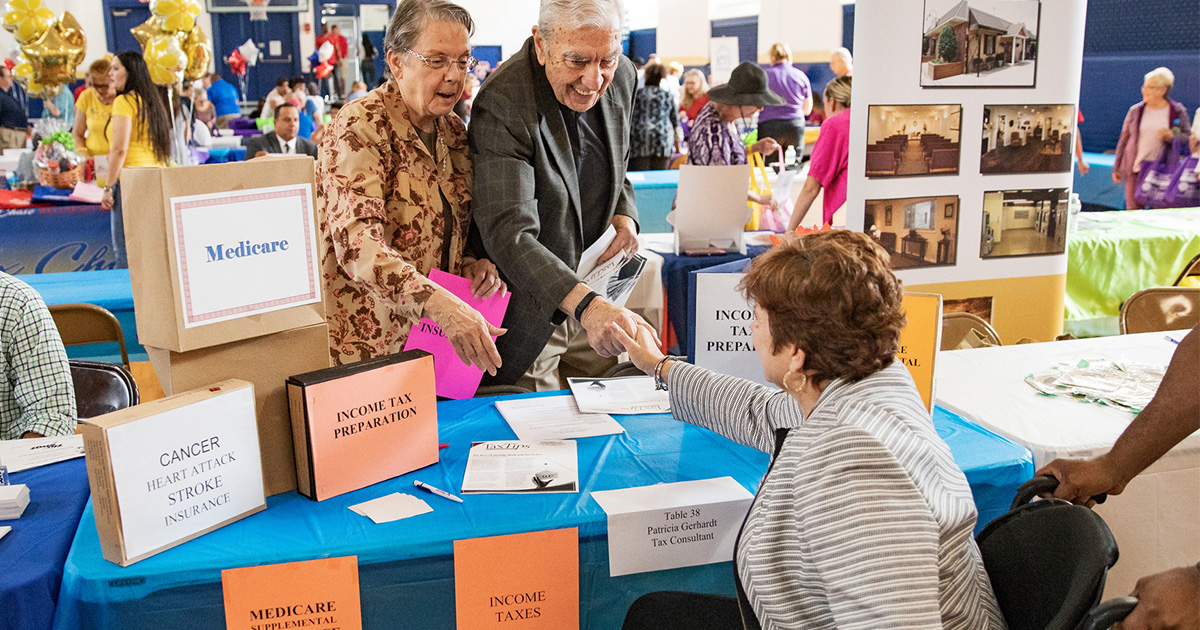
by Christin Brown | October 4, 2018 | News Releases
In her second Senior Expo this fall, the senator brought more than 50 exhibitors together to share information about a multitude of topics vital to older Philadelphians.
PHILADELPHIA, PA, October 4, 2018 – State Sen. Christine Tartaglione brought her annual Senior Expo series to St. Anne’s Rectory-PAL Center in Port Richmond for the first time today, and it was an overwhelming hit with the community as more than 50 exhibitors shared valuable information with hundreds of older residents and their caregivers.
Visitors to the Lehigh Avenue venue benefitted from free health screenings, flu shots and consultations with public agencies and private organizations about a multitude of senior topics, such as prescription medication assistance, housing finance, consumer protection, home healthcare, accessibility for the disabled, transportation, and estate planning. Exhibitors represented state and local government offices, utilities, the healthcare sector, education, banking, investment and law enforcement, to name a few.
“These agencies and organizations all help seniors throughout the year, but today was a rare opportunity for people to meet them all in one place. My goal for all of my senior expos is to make it convenient for constituents to network with these resources in their own neighborhood,” Tartaglione said.
Each year, Senator Tartaglione hosts three Senior Expos in the early fall. This year’s first event was held in Mayfair on Sept. 27. The third and final Expo will be on Thursday, Oct. 11, at Fox Chase Recreation Center, 7901 Ridgeway St., from 10 a.m. to 1 p.m. The event is free and open to local seniors and their caregivers.
“Growing older can bring great joy to each of us, but it can also bring many new challenges,” Tartaglione said. “I’m thankful that there are so many organizations in our community that care about senior citizens and want to help them enjoy their Golden Years.”
Call the senator’s district office at 215-533-0440 or 215-291-4653 (Spanish) for information about the next Senior Expo.
# # #
If you would like more information about this topic, please contact William Kenny at 215-533-0440 or email at [email protected].
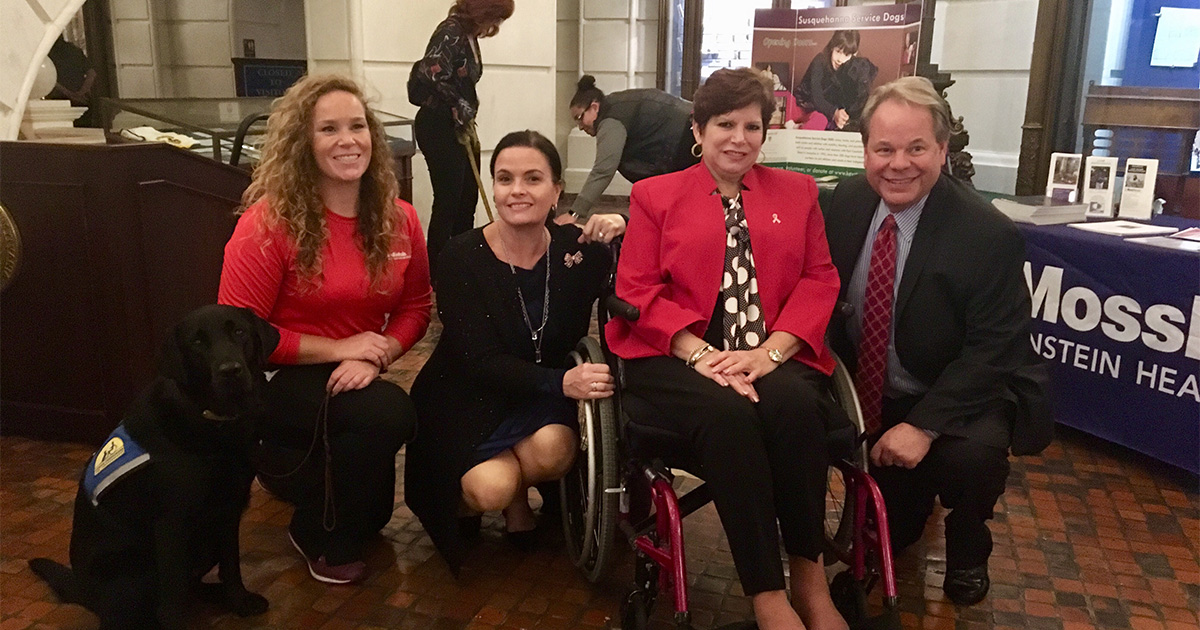
by Christin Brown | October 3, 2018 | News Releases
The Capitol’s Main Rotunda was the setting for the senator’s annual gathering of public agencies and private organizations dedicated to helping people with disabilities.
HARRISBURG, PA, October 3, 2018 – The Pennsylvania Capitol became a one-stop resource for people living with physical and cognitive disabilities today as a multitude of public and private providers gathered in the Main Rotunda for State Sen. Christine Tartaglione’s annual Disability Awareness Day.
Exhibitors shared information about assistive services and technologies to help the senator kick off National Disability Employment Awareness Month.
“People living with physical and cognitive challenges often face an uphill battle as they seek to work, go to school and manage their daily lives,” Tartaglione said. “Fortunately, Pennsylvania has many public agencies and private organizations whose mission is to help disabled people do the job. My objective here is to bring these resources directly to the people who will benefit from them.”
Hundreds of Capitol visitors and passers-by stopped to chat with exhibitors such as the PA Office of Vocational Rehabilitation, PA Assistive Technology, the Institute on Disabilities at Temple University, AgrAbility PA, Einstein/Moss Rehab, Living Well Your Way, the Center for Independent Living of Central PA, United Cerebral Palsy and Uniquesource. They also met a couple of the beautiful life partners from Susquehanna Service Dogs. These agencies and organizations offer tools and programs that help disabled people maximize their potential in the workforce and in their communities.
“People with disabilities fulfill a vital role in Pennsylvania’s workforce and they should be given every opportunity to participate,” Tartaglione said. “My annual Disability Awareness Day is a great way for advocates to network with the constituents they serve.”
Disability Awareness Day occurred one day after the Senate unanimously passed Tartaglione’s resolution to recognize October as National Disability Employment Awareness Month in the Commonwealth. The observance calls attention to disability employment issues and celebrates the contributions of workers with disabilities. This year’s theme is America’s Workforce: Empowering All.
Senator Tartaglione has long been a leading advocate in Pennsylvania for people with disabilities. She was instrumental in creating the state’s Office for People with Disabilities, which serves as a go-to source for information about the many state and county agencies that offer services for people who need assistance in their daily lives.
# # #
If you would like more information about this topic, please contact William Kenny at 215-533-0440 or email at [email protected].
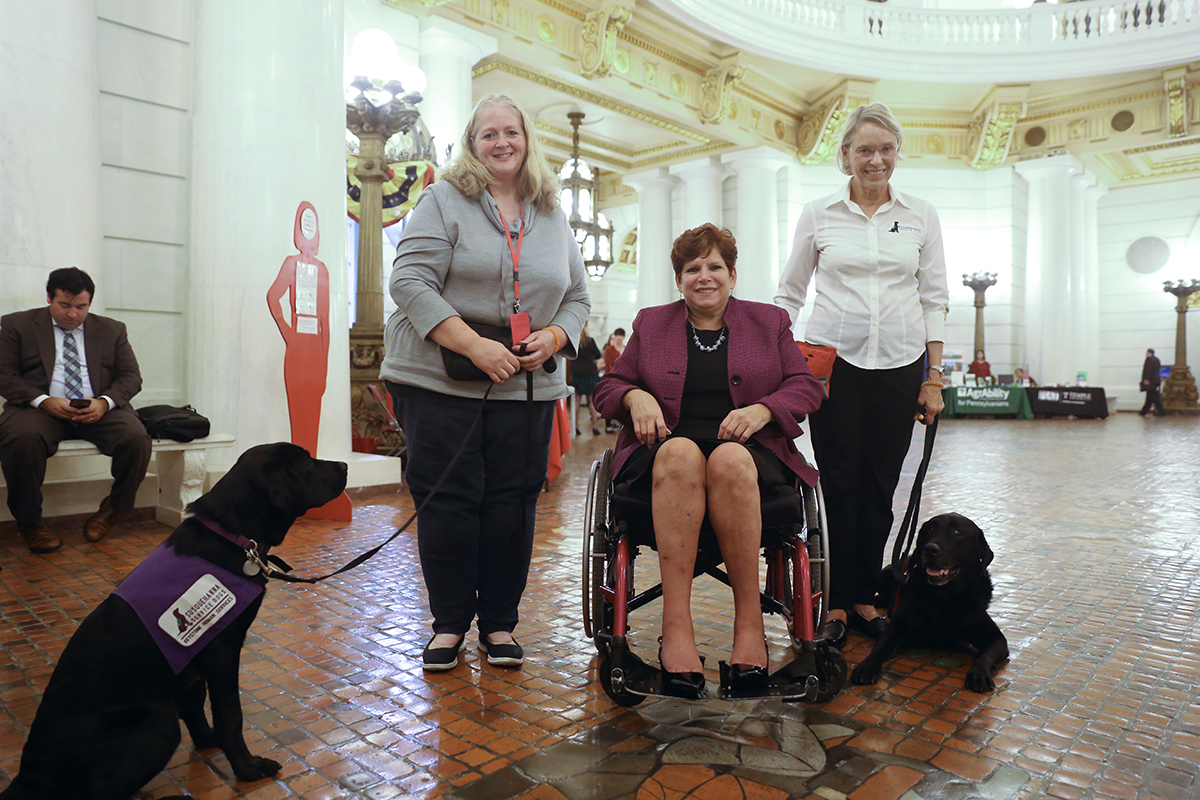
by Christin Brown | October 2, 2018 | News Releases
The senator’s annual Disability Awareness Day at the Capitol will highlight ways that people with disabilities can contribute meaningfully in the workplace and beyond.
HARRISBURG, PA, October 2, 2018 – The Pennsylvania Senate today unanimously adopted Sen. Christine Tartaglione’s resolution recognizing October as Disability Employment Awareness Month in the Commonwealth. Tartaglione will kick off the month-long campaign tomorrow, Oct. 3, when she hosts her annual Disability Awareness Day in the Capitol’s Main Rotunda.
Pennsylvania’s observance coincides with National Disability Awareness Month and shares the same goals: to call attention to disability employment issues and celebrate the many and varied contributions of America’s workers with disabilities. This year’s theme is America’s Workforce: Empowering All.
“Twenty-eight years ago, Congress passed the Americans with Disabilities Act, which requires employers to provide reasonable accommodations for employees with disabilities,” Tartaglione said. “Today, millions of Americans are living with disabilities, including many military veterans – and including myself. We deserve the opportunity to work productively, to support ourselves financially and to contribute to the economic prosperity of our society.”
Senator Tartaglione urged all employers, labor organizations and community groups to participate in Disability Employment Awareness Month in any number of ways. Companies or employees may hang a commemorative poster at the workplace or do something more elaborate, like implementing a disability education program. For more ideas and resources, visit the U.S. Department of Labor website here: https://www.dol.gov/odep/topics/ndeam/
More disability employment resources will be available to visitors to the Capitol’s Main Rotunda this Wednesday, Oct. 3, from 10 a.m. to 1 p.m., when Senator Tartaglione will host her annual Disability Awareness Day. Exhibitors will share information about assistive technologies, vocational rehabilitation, independent living, service animals and many other topics.
“Together, we can help foster a more inclusive workforce where people are recognized not for their limitations, but for their abilities,” Tartaglione said.
# # #
If you would like more information about this topic, please contact William Kenny at 215-533-0440 or email at [email protected].
by Christin Brown | October 2, 2018 | News Releases
PHILADELPHIA, PA, October 2, 2018 – State Sen. Christine Tartaglione invites older Philadelphians and their primary caregivers to the second of her three annual Senior Expos this Thursday at the St. Anne’s Rectory-PAL Center in Port Richmond from 10 a.m. to 1 p.m. The Expo will offer flu shots, free health screenings and information about a multitude of senior programs and services offered by more than 50 public agencies and private providers. Topics will include healthcare, housing, financial services, consumer protection and crime prevention. This annual series of events will conclude on Thursday, Oct. 11, at Fox Chase Recreation Center. Media coverage is encouraged.
Thursday, Oct. 4: St. Anne’s Rectory-PAL Center, 2328 E. Lehigh Ave., 10 a.m. to 1 p.m.
Thursday, Oct. 11: Fox Chase Recreation Center, 7901 Ridgeway St., 10 a.m. to 1 p.m.
For Information (public): Call 215-533-0440 or 215-291-4653 (Spanish).
# # #
If you would like more information about this topic, please contact William Kenny at 215-533-0440 or email at [email protected].
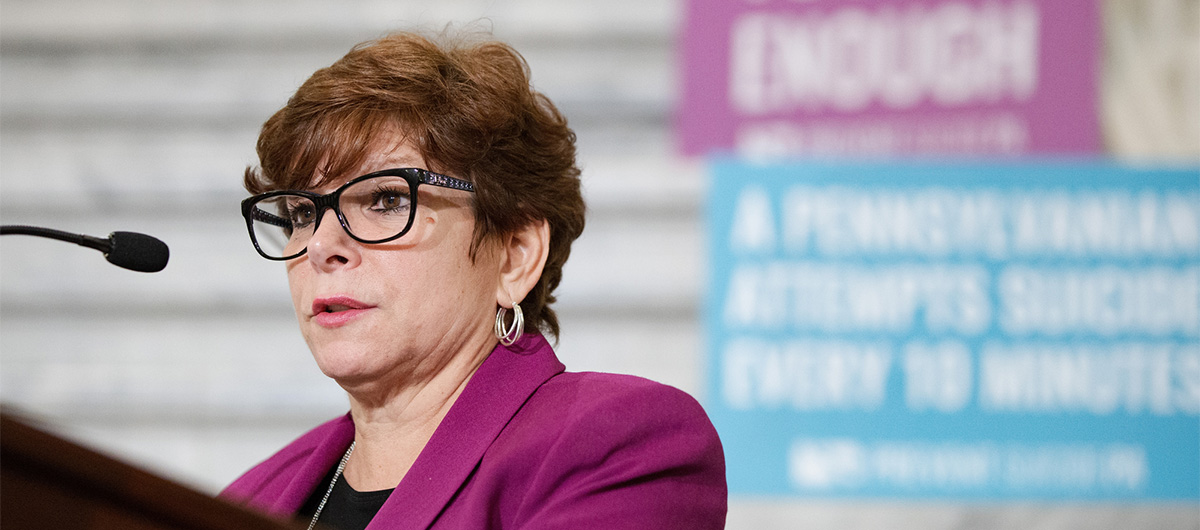
by Christin Brown | October 2, 2018 | News Releases
After Tartaglione addressed the advocacy group in the Capitol’s Main Rotunda, the Senate unanimously adopted her Suicide Prevention Day resolution
HARRISBURG, PA, October 2, 2018 – State Sen. Christine Tartaglione yesterday called upon Pennsylvanians to take a more proactive approach in preventing suicide, which is a problem that continues to grow statewide, across the nation and around the world.
A short time after Senator Tartaglione provided details of the harrowing problem in her remarks during the Suicide Prevention and Awareness Day in the Capitol’s Main Rotunda, the senate unanimously adopted her resolution recognizing World Suicide Prevention Day in the Commonwealth.
“It’s the tenth-leading cause of death in the United States – more prevalent than liver disease, high blood pressure or murder,” Tartaglione said. “Almost 45,000 Americans took their own lives in 2016. About 2,000 of those deaths occurred in Pennsylvania. Those figures don’t account for the estimated one million suicide attempts that occur each year. Nor do they reveal the immeasurable harm endured by countless survivors: the relatives, friends, coworkers and classmates of those who die by suicide.”
According to the Centers for Disease Control, the nation’s suicide rate has grown by 30 percent since 1999. In Pennsylvania, the growth has been closer to 35 percent, according to Prevent Suicide PA, which organized yesterday’s observance at the Capitol.
Suicide affects all walks of life, regardless of age, gender, race, religion, education, income or sexuality. Men die by suicide more than three times as often as women, but women attempt suicide three times more than men. Suicide rates are highest for Americans aged 45 and older, but suicide is the second-leading cause of death for those in their teens and early 20s. Suicide rates are exceptionally high for LGBTQ people, those with chronic pain, those on the Autism spectrum, active-duty military and veterans.
“Yet, we don’t discuss suicide nearly enough,” Tartaglione said. “How often in our daily lives do we approach the subject of suicide on a truly personal level? My hope is that World Suicide Prevention Day will inspire more public dialogue and more private, personal conversations about suicide. I hope that we will become more educated about the risk factors and warning signs. I hope that families, friends, coworkers and classmates will learn to recognize when a loved one is in danger. And I hope the many troubled souls who are contemplating suicide will know where to find help and will feel empowered to seek it.”
If you or someone you know may be facing a crisis, call the Suicide Prevention Lifeline at 1-800-273-8255.
# # #
If you would like more information about this topic, please contact William Kenny at 215-533-0440 or email at [email protected].

by Christin Brown | September 27, 2018 | News Releases
Public and private providers shared valuable information on topics ranging from healthcare and financial services to housing and consumer protection
PHILADELPHIA, PA, September 27, 2018 – Aging can pose many challenges, but Pennsylvania Sen. Christine Tartaglione made it a lot easier for hundreds of Northeast Philadelphia seniors and their caregivers today as she hosted the first of her three annual Senior Expos at the Mayfair Community Center.
 Attendees from throughout the community met with exhibitors representing a variety of sectors including government, healthcare, banking, investment, housing and law enforcement, to name a few. Representatives shared information about prescription medication assistance, housing finance, consumer protection, accessibility for the disabled, home healthcare, transportation and estate planning.
Attendees from throughout the community met with exhibitors representing a variety of sectors including government, healthcare, banking, investment, housing and law enforcement, to name a few. Representatives shared information about prescription medication assistance, housing finance, consumer protection, accessibility for the disabled, home healthcare, transportation and estate planning.
“We should make it our highest priority to take care of our older relatives, friends and neighbors. Unfortunately, many families don’t know where to turn for help when life presents them with challenging circumstances,” Senator Tartaglione said. “My hope in hosting these Senior Expos is to provide a single venue where people can find help regardless of their specific needs.”
Individuals who were unable to attend today’s event may benefit from many of the same resources at Senator Tartaglione’s two upcoming Senior Expos. The first will be on Oct. 4 at St. Anne’s Rectory-PAL, 2328 E. Lehigh Ave.; followed by Oct. 11 at Fox Chase Recreation Center, 7901 Ridgeway St. All Expos run from 10 a.m. to 1 p.m. Call the senator’s district office at 215-533-0440 or 215-291-4653 (Spanish) for information.
# # #
If you would like more information about this topic, please contact William Kenny at 215-533-0440 or email at [email protected].
by Christin Brown | September 27, 2018 | News Releases
September offers an opportunity to learn about spinal cord injuries, recognize the daily challenges encountered by injured people and acknowledge their achievements
PHILADELPHIA, PA, September 27, 2018 – The Pennsylvania Senate unanimously adopted a resolution introduced by Sen. Christine Tartaglione this week recognizing September as National Spinal Cord Injury Awareness Month in the Commonwealth.
“More than 300,000 Americans are living with spinal cord injuries, including 40,000 military veterans and thousands of Pennsylvanians,” Tartaglione said. “Every 48 minutes, another American becomes paralyzed from a spinal cord injury. That means there will be close to 12,000 new spinal cord injury patients in the United States this year.”
“This month offers us the opportunity to learn about spinal cord injuries, recognize the daily challenges encountered by injured people and acknowledge the achievements of those Americans living with spinal cord injuries.”
Senator Tartaglione has overcome many challenges since she injured her own spine in a 2003 boating accident and has been one of the leading advocates in the Pennsylvania legislature for people with spinal cord injuries, as well as those with other physical and intellectual challenges. She was a leading force in the creation of Pennsylvania’s Office for People with Disabilities, which serves as one-stop resource for information about supportive services available to people facing physical and intellectual challenges.
First designated by the U.S. Senate in 2013, National Spinal Cord Injury Awareness Month enables advocates to highlight recent medical breakthroughs and to share the urgent need for new treatments to reduce, reverse and prevent paralysis.
“Every person with a spinal cord injury deserves the chance for a better quality of life,” Tartaglione said.
# # #
If you would like more information about this topic, please contact William Kenny at 215-533-0440 or email at [email protected].

by Christin Brown | September 26, 2018 | News Releases
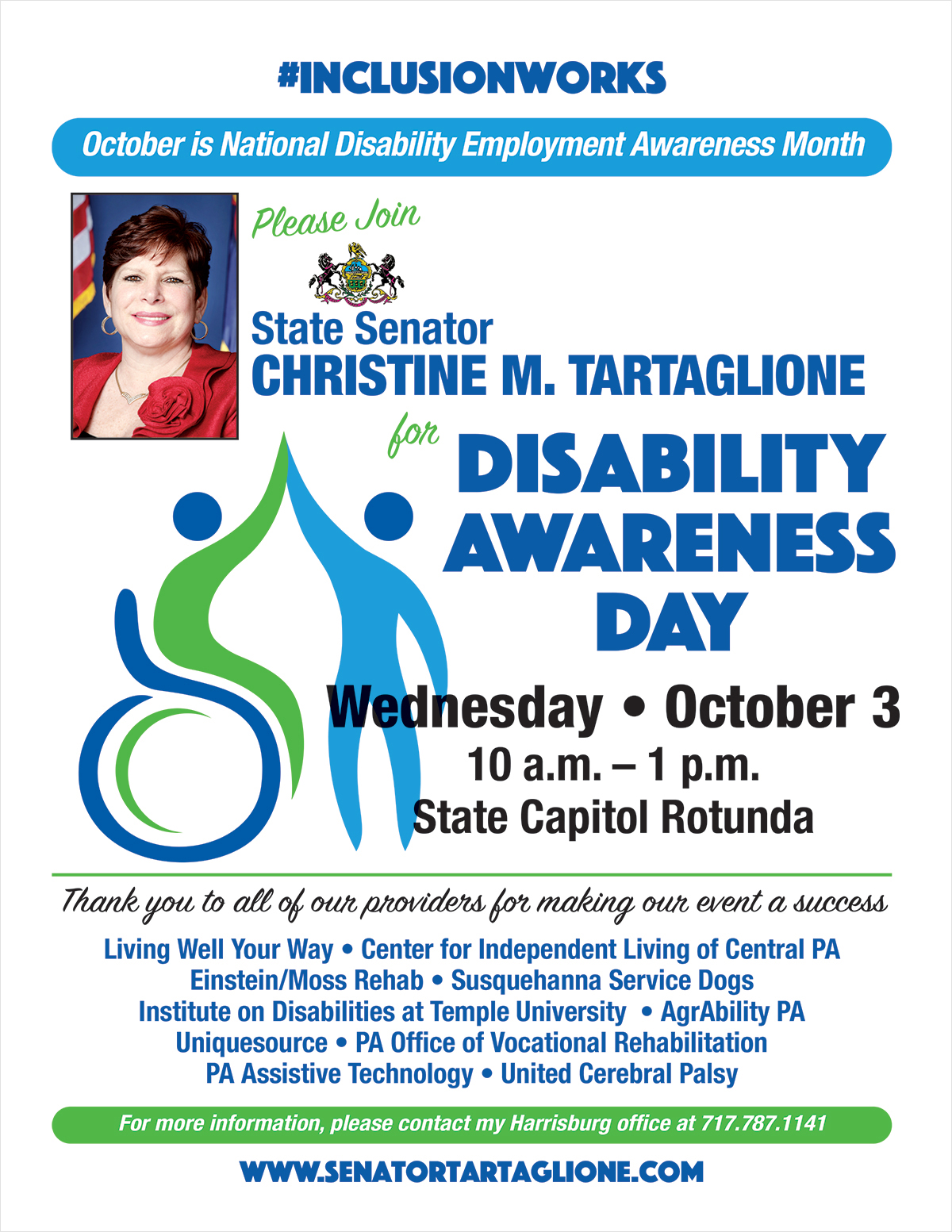 The event coincides with National Disability Employment Awareness Month and will feature many exhibitors offering information about accessibility products and services.
The event coincides with National Disability Employment Awareness Month and will feature many exhibitors offering information about accessibility products and services.
HARRISBURG, PA, September 26, 2018 – Sen. Christine Tartaglione invites the community to the Pennsylvania Capitol on Wednesday, Oct. 3, to learn about a multitude of resources available to persons with disabilities. Tartaglione’s annual Disability Awareness Day will be held in the Main Rotunda from 10 a.m. to 1 p.m. and feature many exhibitors offering information about accessibility products and services.
Disability Employment Awareness Day coincides with National Disability Employment Awareness Month throughout October. This month-long national campaign raises awareness about disability employment issues and honors the many contributions of workers with disabilities. The observance further promotes positive employment outcomes for people with disabilities and endeavors to expand ideas about what youths with disabilities can achieve when they receive encouragement and support for their ambitions.
# # #
If you would like more information about this topic, please contact William Kenny at 215-533-0440 or email at [email protected].

by Christin Brown | September 25, 2018 | News Releases
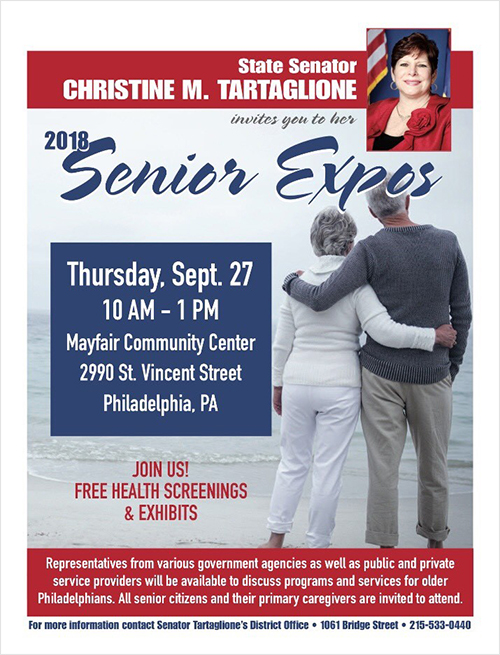 PHILADELPHIA, PA, September 25, 2018 – State Sen. Christine Tartaglione invites older Philadelphians and their primary caregivers to the first of her three annual Senior Expos this Thursday at the Mayfair Community Center from 10 a.m. to 1 p.m. The Expo will offer free health screenings and information about a multitude of senior programs and services offered by dozens of public agencies and private providers. Topics will include healthcare, housing, financial services and crime prevention. This annual series of events will continue Thursday, Oct. 4, at St. Anne’s Rectory PAL Center; then on Thursday, Oct. 11, at Fox Chase Recreation Center.
PHILADELPHIA, PA, September 25, 2018 – State Sen. Christine Tartaglione invites older Philadelphians and their primary caregivers to the first of her three annual Senior Expos this Thursday at the Mayfair Community Center from 10 a.m. to 1 p.m. The Expo will offer free health screenings and information about a multitude of senior programs and services offered by dozens of public agencies and private providers. Topics will include healthcare, housing, financial services and crime prevention. This annual series of events will continue Thursday, Oct. 4, at St. Anne’s Rectory PAL Center; then on Thursday, Oct. 11, at Fox Chase Recreation Center.
Thursday, Sept. 27: Mayfair Community Center, 2990 Saint Vincent St.
Thursday, Oct. 4: St. Anne’s Rectory-PAL Center, 2328 E. Lehigh Ave.
Thursday, Oct. 11: Fox Chase Recreation Center, 7901 Ridgeway St.
For Information (public): Call 215-533-0440 or 215-291-4653 (Spanish).
# # #
If you would like more information about this topic, please contact William Kenny at 215-533-0440 or email at [email protected].
by Christin Brown | September 24, 2018 | News Releases
The month-long national observance will continue through October 15 and recognize the achievements of Hispanic Americans while celebrating their rich culture
PHILADELPHIA, PA, September 24, 2018 – The Pennsylvania Senate today unanimously adopted Sen. Christine Tartaglione’s resolution designating Hispanic Heritage Month in the Commonwealth. The commemoration began on Sept. 15 and will continue through Oct. 15. It coincides with National Hispanic Heritage Month in the United States.
The commemoration recognizes the many achievements of Hispanic Americans and celebrates their rich contributions to the American melting pot. President Lyndon Johnson created Hispanic Heritage Week in 1968. Twenty years later, President Ronald Reagan proclaimed the inaugural National Hispanic Heritage Month, starting on Sept. 15 that year. That date coincides with independence observances in Costa Rica, El Salvador, Guatemala, Honduras and Nicaragua. Mexico and Chile also celebrate their independence in mid-September.
“Hispanic Heritage Month is a great time to indulge in cultural fiestas, but it’s also a wonderful educational opportunity,” Tartaglione said. “We can learn how some of the nation’s earliest settlers brought Hispanic traditions and customs to Pennsylvania during the 1400s, and how Hispanic Americans constitute the nation’s largest and fastest growing ethnic group.”
Senator Tartaglione noted the contributions of many distinguished Hispanic Americans including Supreme Court Justice Sonia Sotomayor, Astronaut Ellen Ochoa, Labor Organizer Cesar Chavez, Rock N Roll Hall of Fame Member Carlos Santana and multi-award-winning Performer Rita Moreno.
She also invited all Pennsylvanians to visit Philadelphia on Sept. 30 for the annual Puerto Rican Day Parade and Festival, a community tradition for more than 50 years.
“The Hispanic community has made a profound and positive influence on our Commonwealth through their strong commitment to family, faith, hard work and service,” Tartaglione said.
# # #
If you would like more information about this topic, please contact William Kenny at 215-533-0440 or email at [email protected].
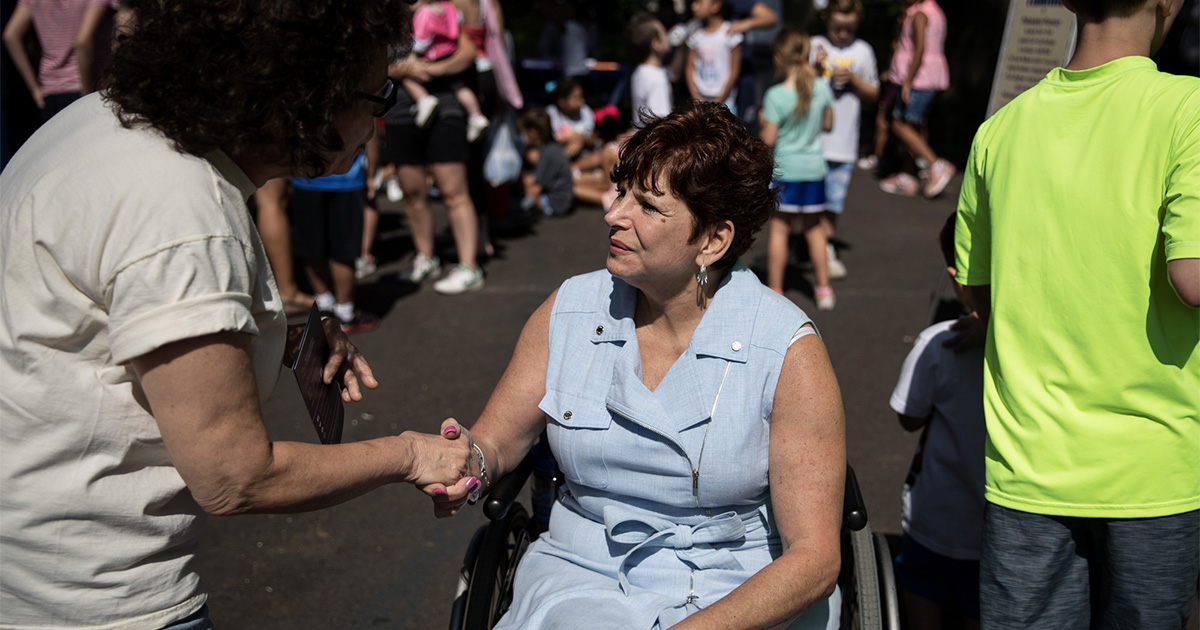
by Christin Brown | August 23, 2018 | News Releases
Music, face painting, police horses and the senator’s back-to-school backpack giveaway made it a special occasion for hundreds of children and their caregivers.
PHILADELPHIA, PA, August 23, 2018 – Sunshine and smiling children highlighted the third and final round of state Sen. Christine Tartaglione’s annual Community Picnic series today as hundreds of youngsters and their caregivers flocked to Fox Chase Recreation Center for an event that has quickly become one of the most popular attractions on the local summer calendar.
Now in its second year at Fox Chase, the gathering carried the momentum built through Senator Tartaglione’s previous two Community Picnics on Aug. 2 at Fairhill Square Park and Aug. 16 at Wissinoming Park. DJ music, free refreshments, face painting, Philadelphia police horses, gift basket raffles and a variety of vendors kept visitors entertained and informed throughout the morning and early afternoon. The excitement peaked when Senator Tartaglione handed out free backpacks and back-to-school supplies to attending children.
 All told, the senator distributed 250 backpacks to the young learners at Fox Chase, and about 1,100 at all three picnics combined.
All told, the senator distributed 250 backpacks to the young learners at Fox Chase, and about 1,100 at all three picnics combined.
“This never would have been possible without the support of many generous donors and community partners,” Senator Tartaglione said. “These Community Picnics bring together businesses, non-profit organizations and public agencies for a common goal – to advocate for the education of our children. It’s very reassuring and satisfying to know that the picnics get bigger and bigger each year with many new partners and a lot more public attention.”
With the 2018-19 school year mere days away for many local children, the opportunity to get a head start on back-to-school shopping was a big attraction for their caregivers, as was the opportunity to spend a mild late summer day in park-like surroundings.
“I like to teach kids about giving back and I think this was a way for kids to see that when you give to your community, how good things come back to you,” said Marie Louissaint, counselor at Early Learning Children’s Academy of Rising Sun Avenue. “They were excited, especially when they saw the mounted police officers and the face painting. The fire truck was really big with the little ones. Now they have a fresh start (on the school year), a nice new beginning.”
Kids weren’t the only ones to benefit. Fun and games aside, many of the older folks found some time to gather valuable information about a plethora of topics, such as home health care, assistive technologies for the disabled, adult daycare and rehabilitation, insurance and registering to vote.
Many of the same presenters are also scheduled to participate in Senator Tartaglione’s upcoming Senior Expos, an annual series of events to be held on Sept. 27 at Mayfair Community Center (2990 Saint Vincent St.), Oct. 4 at St. Ann’s Rectory PAL (2328 E. Lehigh Ave.) and Oct. 11 at Fox Chase Rec Center (7901 Ridgeway St.). All Senior Expos will be from 10 a.m. to 1 p.m. Call Senator Tartaglione’s district offices at 215-533-0440 or 215-291-4653 for information.
# # #
If you would like more information about this topic, please contact William Kenny at 215-533-0440 or email at [email protected].

by Christin Brown | August 17, 2018 | News Releases
Music, face painting, police horses and the senator’s back-to-school backpack giveaway made it a special occasion for hundreds of children and their caregivers.
PHILADELPHIA, PA, August 17, 2018 – State Sen. Christine Tartaglione’s annual Community Picnic was a smash hit with the hundreds of children and caregivers who converged at Wissinoming Park yesterday to delight in free music, soft pretzels, water ice, face painting and the senator’s popular back-to-scbool backpack giveaway. About 500 school children walked away wearing new school bags on their shoulders and smiles on their faces.
The event was the second of Tartaglione’s three Community Picnics scheduled this month in her 2nd Senate District. On Aug. 2, the senator handed out more than 300 backpacks to children at Fairhill Square Park in North Philadelphia. The third picnic will be held on Thursday, Aug. 23, from 10 a.m. to 2 p.m., at Fox Chase Recreation Center, 7901 Ridgeway St. It is free to attend and open to the public.
“August has become one of my favorite times of the year because it gives me the chance to meet so many beautiful children while helping their families ease the costs of getting a valuable education,” Senator Tartaglione said. “If we can give each child a backpack filled with school supplies, that’s one less cost their caregivers will have to bear. This is a real group effort that brings together our business sponsors, community organizations, recreation centers and day care centers for a day of summer fun.”
Yesterday’s event featured many longtime partners and some popular new ones. Attendees enjoyed refreshing water ice and soft pretzels and had their faces painted like their favorite superheroes. Senator Tartaglione raffled off gift baskets and basketballs before the children lined up for the big backpack giveaway.
The newly renovated Wissinoming Park provided the ideal backdrop on a hot and steamy day as many visitors cooled off beneath towering shade trees or in the water spray-ground.
“I welcome everyone to join us again next week. It’s a great chance to meet new friends and enjoy the summer one more time before the new school year!” Senator Tartaglione said.
# # #
If you would like more information about this topic, please contact William Kenny at 215-533-0440 or email at [email protected].

by Christin Brown | June 28, 2018 | Minimum Wage, News Releases
PHILADELPHIA, PA, June 28, 2018 – State Sen. Christine Tartaglione applauded Gov. Tom Wolf’s signing of an executive order today that raises the minimum wage for state employees and contractors to a level matching the provisions of legislation introduced by Tartaglione in the Senate earlier this year. The executive order raises the minimum wage for state employees and contractors to $12 per hour effective July 1, and institutes incremental annual increases that will raise the minimum wage to $15 in 2024. After then, the minimum wage would be tied to annual cost of living adjustments.
Sen. Tartaglione issued the following statement regarding the executive order:
Gov. Wolf’s executive order represents a major step forward for state employees and contractors, and for the cause of fair, family-sustaining wages across the Commonwealth. As we have seen through many recent national events, workers have been under attack by forces that seek to stifle their collective voice and their power to negotiate for decent wages, healthcare plans, pensions and working conditions.
Just yesterday, the United States Supreme Court struck down a 40-year-old precedent allowing public-sector labor unions to fund worker advocacy through fair share fees. And the National Labor Relations Board recently changed its rules to allow employers to strip workers of the right to resolve their grievances in a court of law.
The federal government hasn’t raised the minimum wage nationwide since 2009, and Pennsylvania hasn’t raised its minimum wage in more than a decade. At $7.25 an hour, a full-time worker would make about $15,000 a year. That’s below the federal poverty level for a two-person household. According to the National Low Income Housing Coalition, there isn’t a state in the country where a full-time, minimum-wage worker can afford to pay rent for a modest two-bedroom apartment.
Conversely, higher wages boost the economy and reduce employee turnover because workers are also consumers. So when they make more money, they tend to spend more and businesses benefit.
That’s why I introduced Senate Bill 1044 earlier this year, so that employers won’t have the option of paying workers less than a living wage. Today, Gov. Wolf’s executive order makes a bold statement that Pennsylvania cares about working families and recognizes the vital role that a vibrant middle class plays in a healthy and sustainable economy.
# # #
If you would like more information about this topic, please contact William Kenny at 215-533-0440 or email at [email protected].
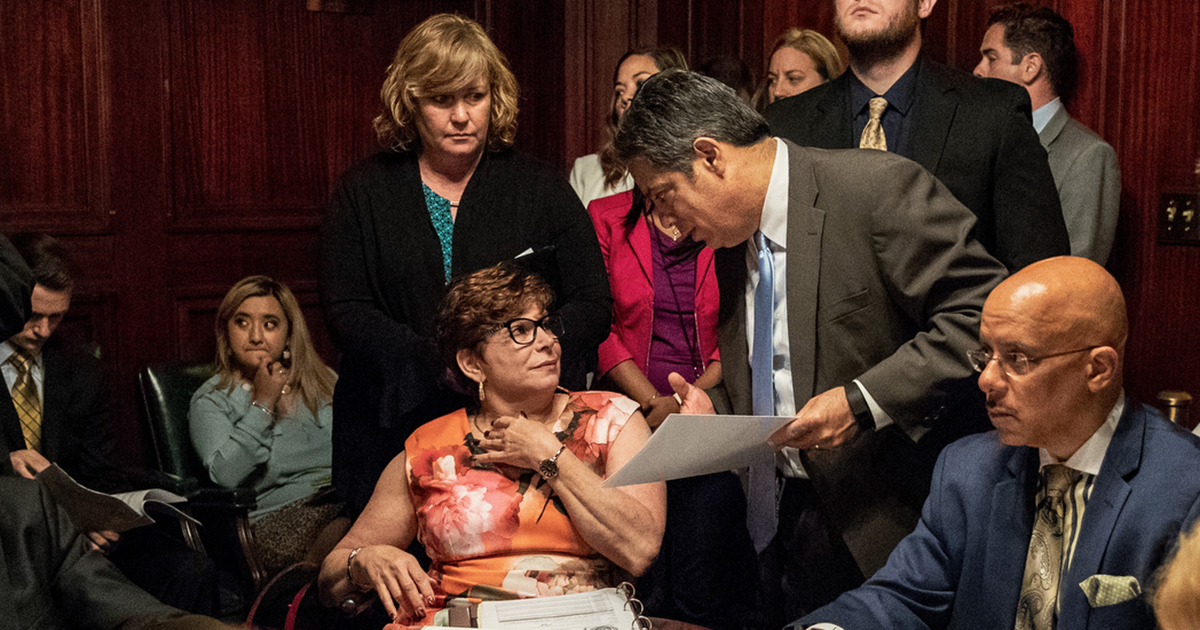
by Christin Brown | June 22, 2018 | News Releases
HARRISBURG, PA, June 22, 2018 – State Sen. Christine Tartaglione applauded today’s early passage of a Fiscal Year 2018-19 budget that includes new investments in workforce development, education, health care and social justice. The Senate voted, 47-2, in support of the budget (HB 2121) previously passed by the Pennsylvania House. The budget now awaits Gov. Tom Wolf’s signature.
“This budget is an example of the great things we can accomplish when we work together in a bi-partisan way to create programs that benefit all Pennsylvanians,” Tartaglione said. “As minority chairman of the Senate Labor and Industry Committee, I am especially proud of the workforce development initiatives, such as expanded apprenticeships and partnerships that involve labor organizations, vocational training facilities and the business community. These measures will help more young people find good careers that pay family-sustaining wages and benefits and will help the Commonwealth identify and satisfy its changing workforce needs.”
The approved budget includes a $30 million increase in the allocation for career and technical education through the PA SMART initiative. It also includes a new $7 million apprenticeship training program and a $3 million increase to industry partnerships, both through PA SMART, as well as a $3 million increase for combatting the Spotted Lanternfly infestation that threatens our agriculture industry.
Also today, the Senate unanimously approved the creation of the Keystone Scholars Grant Program through the passage of the omnibus Fiscal Code bill (HB 1929). The Keystone Scholars Grant Program will apply to every child born in Pennsylvania on or after Jan. 1, 2019. Upon receiving notice of a child’s birth, the Treasury Department will set aside $100 in a separate account that will be available to the child once they reach age 18 and enroll in a qualifying institution of higher education or a vocational or technical school. The student would be able to collect the $100, as well as investment earnings attributed to the account.
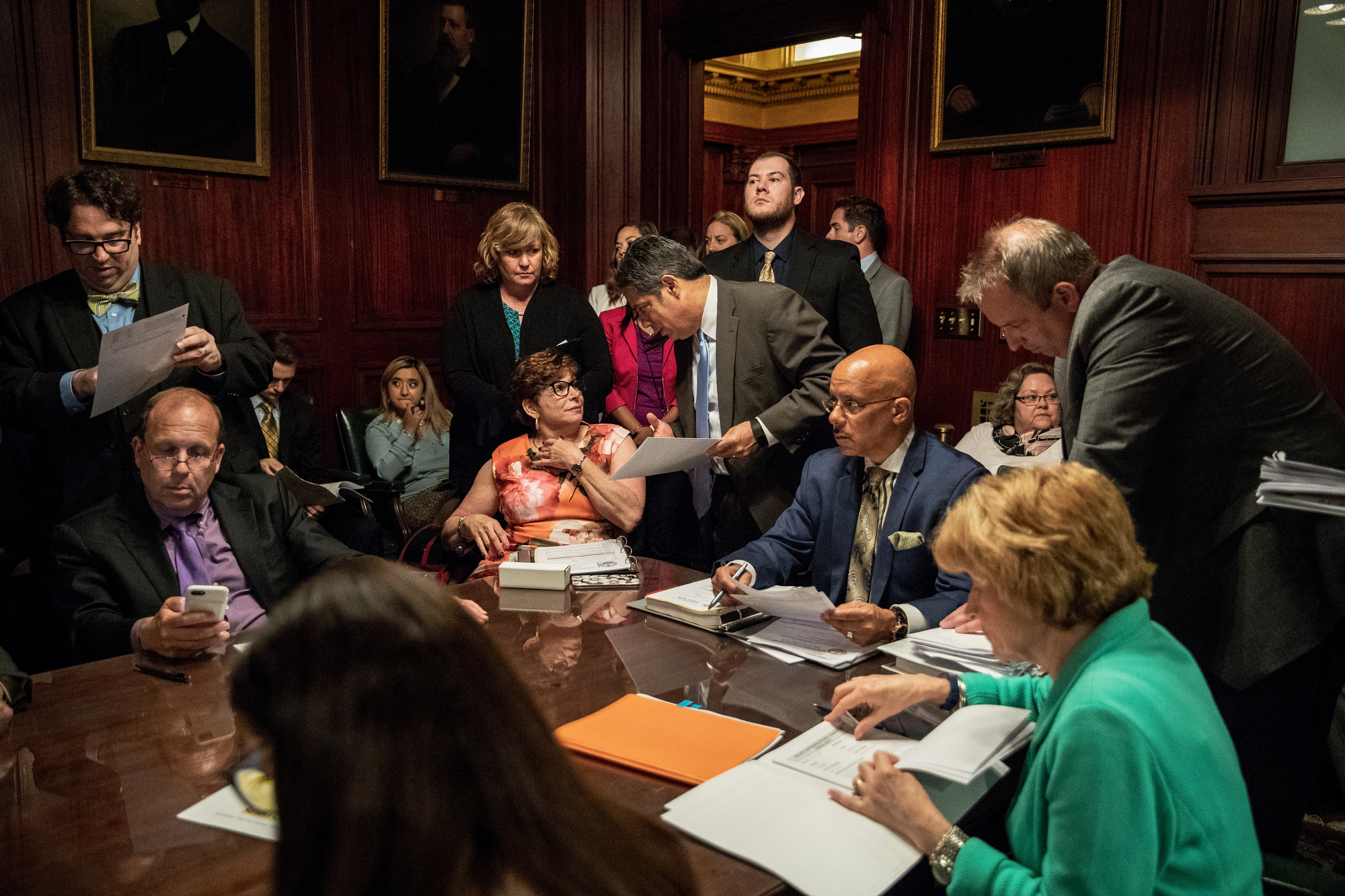 “This Keystone Scholars Grant Program makes an important statement about our commitment to improving education opportunities for future generations of Pennsylvanians,” Tartaglione said. “As each child grows, this funding will grow and will provide them with another incentive to pursue post-secondary education or job training.”
“This Keystone Scholars Grant Program makes an important statement about our commitment to improving education opportunities for future generations of Pennsylvanians,” Tartaglione said. “As each child grows, this funding will grow and will provide them with another incentive to pursue post-secondary education or job training.”
During a busy day at the Capitol, Senator Tartaglione also joined members of the Philadelphia delegations in both the Senate and House, as well as other leaders in the General Assembly, to announce the House’s passage of a $60 million school and community anti-violence package. The legislation originated in the Senate as SB 1142 and sets aside $7.5 million for community anti-violence programs. In addition, municipalities, institutions of higher education, community-based organizations and other entities will be able to apply for funds to support anti-violence initiatives.
The Pennsylvania Commission on Crime and Delinquency will administer the grants through a School Safety and Security Committee. The objective is to reduce violence in schools by addressing it at the community level.
“This level of funding is unprecedented,” Tartaglione said. “Hopefully, this will become a watershed moment in our Commonwealth’s fight against violence in our schools and communities, particularly gun violence. I hope what we’ve accomplished today will usher in a new era of cooperation in the General Assembly on this critical issue.”
# # #
If you would like more information about this topic, please contact William Kenny at 215-533-0440 or email at [email protected].
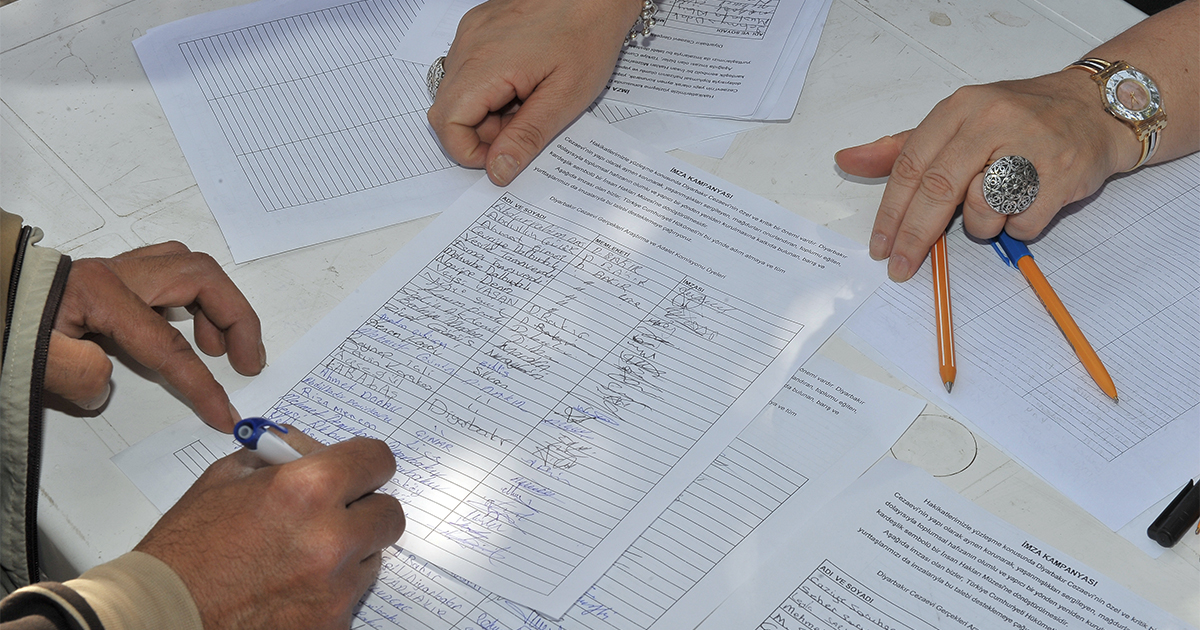
by Christin Brown | June 12, 2018 | News Releases
HARRISBURG, PA, June 12, 2018 – The Pennsylvania Senate voted 46-3 yesterday to approve an amendment by Sen. Christine Tartaglione that would level the playing field for Magisterial District Justice candidates in elections involving an incumbent and one or more non-incumbents.
Under the amended version of Senate Bill 299, incumbent MDJs seeking re-election would no longer be required to collect at least 100 voter signatures to secure a place on the ballot. Instead, they would need only to file a certificate of nomination. But if the incumbent chooses that route, then he or she would be prohibited from challenging the legitimacy of the signatures collected by other hopeful candidates.
“Allowing a sitting Magisterial District Justice to simply submit a certificate of nomination for re-election, as opposed to collecting the 100 signatures, while requiring non-incumbent candidates to collect the requisite number of signatures is unfair,” Sen. Tartaglione said. “My amendment is simple and will level the playing field. It would allow a sitting Justice to submit a certificate of nomination but would prohibit the sitting Justice from challenging any signatures on the opponent’s petition.”
Magisterial District Justices, also known as magistrates, are the judicial system’s first level throughout most of Pennsylvania, excluding Philadelphia where Municipal Court judges serve a similar role. There are more than 500 Magisterial Districts across the state. MDJs preside over hearings involving low-level criminal offenses as well as preliminary hearings for more serious offenses. They further handle low-level civil cases and can preside over weddings, among other duties.
Under state law, MDJs must remain non-political except when running for re-election. Their terms last for six years. Current law requires all candidates for the position to collect at least 100 petition signatures to secure a ballot position. Supporters of the original SB 299, which Sen. Richard Alloway introduced on April 9, contend that the non-political nature of the position places incumbents at a disadvantage because non-incumbents are free to build their political support regardless of the election calendar.
Sen. Tartaglione’s amendment strikes a fair balance in that it would ease the political obligation of the incumbent while ensuring that incumbents cannot benefit from unequal treatment under election law.
With the Senate’s approval, SB 299 moves to the House for consideration.
# # #
If you would like more information about this topic, please contact William Kenny at 215-533-0440 or email at [email protected].



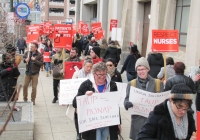
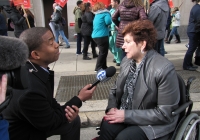
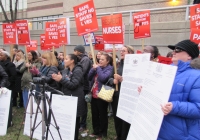

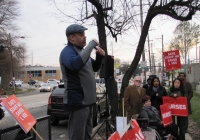
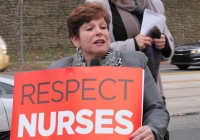

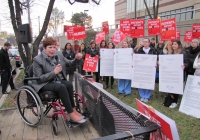


 Pennsylvania Supreme Court Associate Justice Kevin M. Dougherty led Democratic senators in reciting the oath of office. Tartaglione’s mother, longtime Philadelphia City Commissioner Marge Tartaglione, took part in the ceremony by holding the Holy Bible used by her daughter to take the oath.
Pennsylvania Supreme Court Associate Justice Kevin M. Dougherty led Democratic senators in reciting the oath of office. Tartaglione’s mother, longtime Philadelphia City Commissioner Marge Tartaglione, took part in the ceremony by holding the Holy Bible used by her daughter to take the oath. “We are at a critical juncture for our state and for the nation, a time when the economic gap between the very rich and the rest of us continues to widen, and when many corporations, large and small, along with their political allies are driving a coordinated campaign to repeal long-established labor protections, keep wages low, undermine affordable healthcare, and jeopardize retirement security,” Tartaglione said.
“We are at a critical juncture for our state and for the nation, a time when the economic gap between the very rich and the rest of us continues to widen, and when many corporations, large and small, along with their political allies are driving a coordinated campaign to repeal long-established labor protections, keep wages low, undermine affordable healthcare, and jeopardize retirement security,” Tartaglione said.


















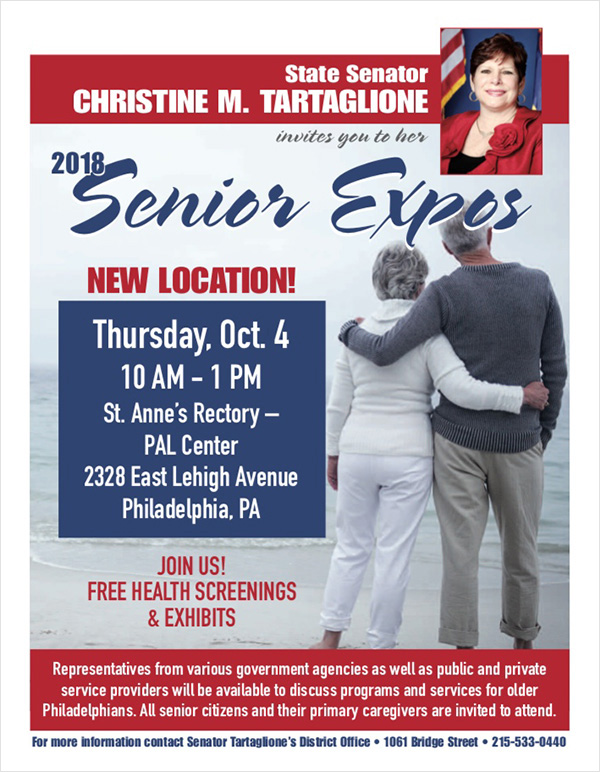
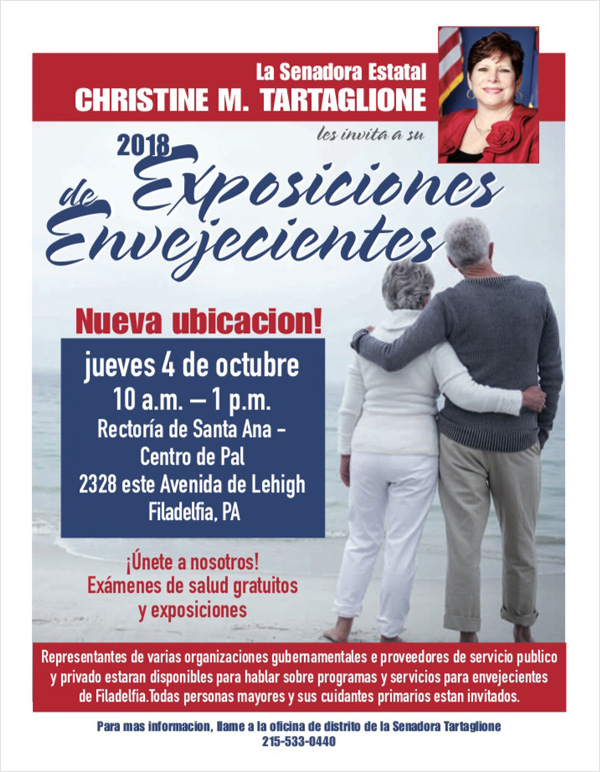

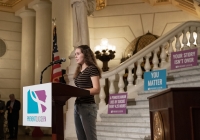

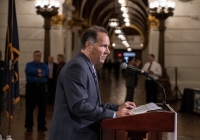
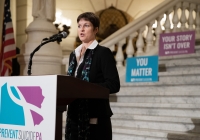
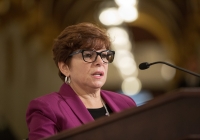
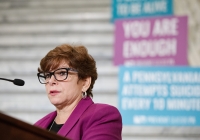


 Attendees from throughout the community met with exhibitors representing a variety of sectors including government, healthcare, banking, investment, housing and law enforcement, to name a few. Representatives shared information about prescription medication assistance, housing finance, consumer protection, accessibility for the disabled, home healthcare, transportation and estate planning.
Attendees from throughout the community met with exhibitors representing a variety of sectors including government, healthcare, banking, investment, housing and law enforcement, to name a few. Representatives shared information about prescription medication assistance, housing finance, consumer protection, accessibility for the disabled, home healthcare, transportation and estate planning.

 PHILADELPHIA, PA, September 25, 2018 – State Sen. Christine Tartaglione invites older Philadelphians and their primary caregivers to the first of her three annual Senior Expos this Thursday at the Mayfair Community Center from 10 a.m. to 1 p.m. The Expo will offer free health screenings and information about a multitude of senior programs and services offered by dozens of public agencies and private providers. Topics will include healthcare, housing, financial services and crime prevention. This annual series of events will continue Thursday, Oct. 4, at St. Anne’s Rectory PAL Center; then on Thursday, Oct. 11, at Fox Chase Recreation Center.
PHILADELPHIA, PA, September 25, 2018 – State Sen. Christine Tartaglione invites older Philadelphians and their primary caregivers to the first of her three annual Senior Expos this Thursday at the Mayfair Community Center from 10 a.m. to 1 p.m. The Expo will offer free health screenings and information about a multitude of senior programs and services offered by dozens of public agencies and private providers. Topics will include healthcare, housing, financial services and crime prevention. This annual series of events will continue Thursday, Oct. 4, at St. Anne’s Rectory PAL Center; then on Thursday, Oct. 11, at Fox Chase Recreation Center.
 All told, the senator distributed 250 backpacks to the young learners at Fox Chase, and about 1,100 at all three picnics combined.
All told, the senator distributed 250 backpacks to the young learners at Fox Chase, and about 1,100 at all three picnics combined.


















































 “This Keystone Scholars Grant Program makes an important statement about our commitment to improving education opportunities for future generations of Pennsylvanians,” Tartaglione said. “As each child grows, this funding will grow and will provide them with another incentive to pursue post-secondary education or job training.”
“This Keystone Scholars Grant Program makes an important statement about our commitment to improving education opportunities for future generations of Pennsylvanians,” Tartaglione said. “As each child grows, this funding will grow and will provide them with another incentive to pursue post-secondary education or job training.”